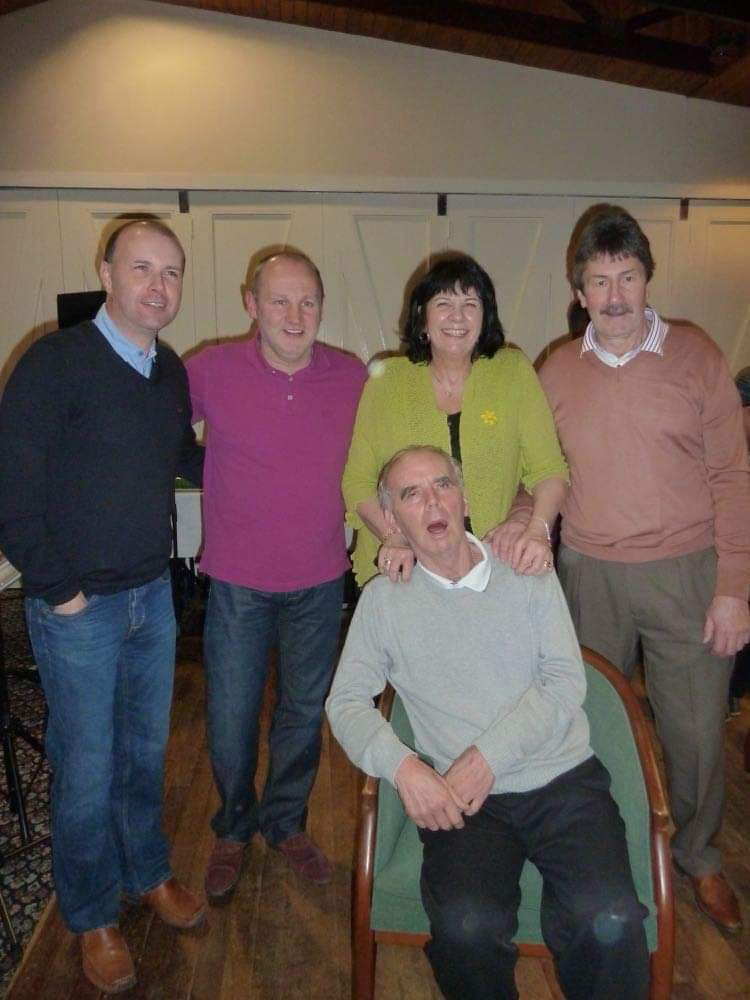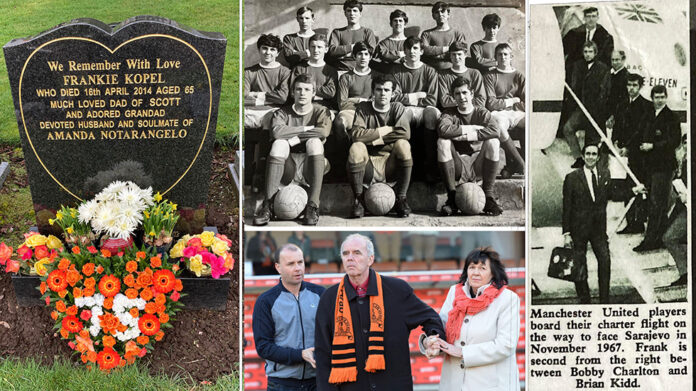Born in Falkirk Frank Kopel was a Busby Babe who found fame at Dundee United, where he earned iconic status. The fabulous fullback won two League Cups and two Scottish Cup runners-up medals during his decade at Tannadice.
Today would have been his 75th birthday. But Frank sadly died after a long battle with dementia 10 years ago next month. He was one of the first people to properly highlight footballers’ links to this awful disease that has claimed the lives of so many of the game’s heroes.
His widow Amanda has campaigned tirelessly ever since for the support of dementia sufferers. She is one of the most dedicated activists in the seemingly never-ending fight to force the game’s governing bodies to make changes and accept responsibility.
Her efforts famously led to the introduction of ‘Franks Law’ in Scotland which has benefitted around 9,000 families. And now she is spear-heading a campaign to persuade the governing bodies to ban heading in football.
‘Frankie and I should be celebrating today, instead I’ve been grieving his loss and mourning him for 10 years. Football has to change because the game is a long, slow killer while heading the ball is part of it,’ says Amanda.
‘The game is called football not headball and the rules have to change. Nobody should head a ball – particularly children. Frankie loved the game but we never imagined for a moment it was so damaging.
“FIFA and the IFAB have a duty of care to protect the next generation of players, particularly with the Euros about to start”.
Industrial Injury
While I personally do not advocate the banning of heading, I do strongly believe that the game has been guilty of neglecting its responsibilities.
Like it or not, dementia caused by heading a football is an industrial injury and it is scandalous that sufferers and their families have not received the financial support so many have been begging for when they’ve needed it most.
Last week it was claimed by former players and their families, who are suing several of the game’s governing bodies, that the minutes of a Football Association meeting in 1983 indicate that it “was always fully aware of the dangers” of concussion in football.
The group alleges that despite that, the FA “failed to take action to reduce the risk to players to the lowest reasonable level”, as stated in ‘particulars of claim’ in a High Court action, and seen by the BBC.
The Football Associations of England and Wales, the English Football League (EFL) and rule-making body the International Football Association Board (IFAB) are accused of being “negligent and in breach of the duty of care owed” to the ex-players.
The claimants are alleged to have suffered “permanent long-term neurological injuries” as a result.
Brain injuries
“At all material times the defendants knew, or ought reasonably to have known, of the likelihood of brain injuries, including long-term neurological injuries, due to the cumulative effect of repeated… injuries to the brain occurring in the sport”, allege the claimants.
They say a meeting of the FA’s medical committee in December 1983 concluded “players who had been concussed should take no further part in the game.
“However, in the absence of disclosure, it is unclear whether (or if so what) action was taken as a result of this conclusion.”
In a statement to the BBC, the FA said it was “not able to comment on ongoing legal proceedings” but “we continue to take a leading role in reviewing and improving the safety of our game”.
Nobby Stiles
The particulars of the legal claim, which the group says have been served on the defendants, relate to 17 former players and families
It is understood that the claim served on the defendants relates to 17 families and former players aged between their late-30s and mid-70s, with seven now dead.
The claim began two years ago and includes the family of 1966 World Cup winner Nobby Stiles, who died in 2020. The former Manchester United hero had prostate cancer and advanced dementia. His brain was diagnosed as having chronic traumatic encephalopathy (CTE) – a form of degenerative disease dementia that is believed to be caused by repeated blows.
Nobby was already struggling with dementia when I filmed the last ever interview with our iconic hero from Collyhurst over a decade ago. The fact that his family is still fighting this battle and now suing the game’s governing bodies highlights how drawn out this campaign has been.
According to research in 2019 ex-footballers are three and a half times more likely to die of dementia than the general population. But it’s not just footballers who are fighting for ‘justice’. Former players from both rugby league and rugby union launched a similar action in 2022.
Compensation
Football is now a multi-billion pound industry but there are so many families affected by dementia who’s footballers never earned the riches of the modern day players. It is time the game’s governing bodies did the honourable thing and look after those who need their help.
As for the campaign to ban heading, well that’s an argument that I’m sure will continue much longer than the legal claim against the governing bodies for financial compensation.
Even Amanda Kopel concedes: “I don’t think I’ll see a total banning of heading the ball in my lifetime.”
But it’s the final comment and photograph shared with me by Frank’s brave widow that resonates so deeply. Her message must not be dismissed any longer by the game’s governing bodies who have shamelessly dragged their feet for so long when it comes to accepting responsibility.
“This breaks my heart John to look at the photo of my soulmate 10 years ago on his 65th birthday and 19 days before he lost his battle. When I look at it I see what heading the ball in Frankie’s career did to him and no one will convince me any different.”


Raising money for the Head for Change charity – a charitable foundation, pioneering positive change for brain health in sport and supporting ex-players who are affected by neurodegenerative disease as a result of their professional sporting career in football or rugby. On Friday May the 10th at the Hampton Hill Theatre, near Twickenham, event organiser John Warrington will be hosting an updated version of the show with Martin O’ Neill, Tony Woodock and guests. Clips from the original production featuring George and Rodney will play out on the big screen. It’s going to be a fab night and tickets are on sale now for just £25 from the theatre box office https://www.hamptonhilltheatre.org.uk/…/drugs-mugs-thugs


